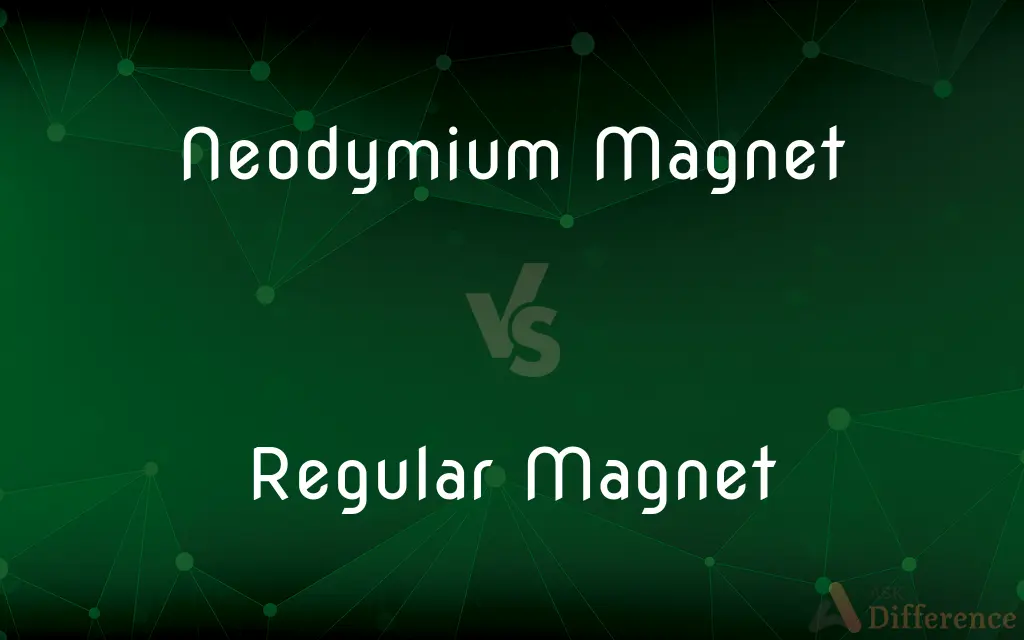Neodymium Magnet vs. Regular Magnet — What's the Difference?
By Tayyaba Rehman — Published on December 20, 2023
A Neodymium Magnet is a powerful rare-earth magnet made from neodymium, iron, and boron, while a Regular Magnet typically refers to weaker ferrite or alnico magnets.

Difference Between Neodymium Magnet and Regular Magnet
Table of Contents
ADVERTISEMENT
Key Differences
Neodymium Magnets are part of the rare-earth magnet family, made primarily from an alloy of neodymium, iron, and boron. In contrast, Regular Magnets, such as ferrite or alnico magnets, don't contain rare-earth elements.
Known for their incredible strength, Neodymium Magnets are among the most potent permanent magnets available today. On the other hand, Regular Magnets usually offer less magnetic force compared to their neodymium counterparts.
Neodymium Magnets often come in various shapes like discs, blocks, or rings and have specific applications in modern technologies. While Regular Magnets are more commonly found in everyday items like speakers and refrigerator magnets.
The price point is another distinguishing factor. Neodymium Magnets tend to be more expensive due to the cost of rare-earth materials. In comparison, Regular Magnets are generally more affordable.
Durability also differentiates them. Neodymium Magnets are susceptible to oxidation and often require a protective coating. Regular Magnets, especially those made of ferrite, are more resistant to corrosion without any added coatings.
ADVERTISEMENT
Comparison Chart
Material Composition
Primarily neodymium, iron, and boron
Typically ferrite or alnico
Strength
Among the most potent permanent magnets
Generally weaker than neodymium magnets
Applications
Modern technologies, HDDs, motors
Speakers, refrigerator magnets, general use
Price
More expensive due to rare-earth materials
More affordable
Corrosion Resistance
Requires protective coatings due to susceptibility
Ferrite magnets resist corrosion without coatings
Compare with Definitions
Neodymium Magnet
Neodymium Magnet is commonly used in advanced technological applications.
Many hard drives utilize Neodymium Magnets for data storage purposes.
Regular Magnet
Regular Magnet can be found in everyday household items.
My doorbell has a Regular Magnet inside it.
Neodymium Magnet
Neodymium Magnet often requires a coating to prevent oxidation.
Ensure your Neodymium Magnet is coated, so it doesn't corrode over time.
Regular Magnet
Regular Magnet is a magnet made without rare-earth materials.
I used a Regular Magnet on my fridge to hold up notes.
Neodymium Magnet
Neodymium Magnet is a type of rare-earth magnet.
I purchased a Neodymium Magnet for my science project.
Regular Magnet
Regular Magnet often boasts better natural corrosion resistance.
My Regular Magnet has been outside for years and hasn't rusted at all.
Neodymium Magnet
Neodymium Magnet possesses an exceptional magnetic force.
The Neodymium Magnet could lift weights much heavier than its size would suggest.
Regular Magnet
Regular Magnet is typically weaker than rare-earth magnets.
While the Regular Magnet holds paper, it can't lift heavy objects like a Neodymium Magnet can.
Neodymium Magnet
Neodymium Magnet is primarily composed of neodymium, iron, and boron.
A Neodymium Magnet's composition makes it distinct and powerful.
Regular Magnet
Regular Magnet is usually more affordable than rare-earth magnets.
For school projects, many prefer using Regular Magnets due to their cost-effectiveness.
Common Curiosities
What is a Neodymium Magnet made of?
A Neodymium Magnet is made from an alloy of neodymium, iron, and boron.
How does a Regular Magnet differ from a Neodymium Magnet?
A Regular Magnet is typically weaker and doesn't contain rare-earth elements, unlike a Neodymium Magnet.
Where are Regular Magnets commonly found?
Regular Magnets are found in everyday items like speakers and refrigerator magnets.
Are Neodymium Magnets stronger than Regular Magnets?
Yes, Neodymium Magnets are among the strongest permanent magnets available.
Why are Neodymium Magnets more expensive?
They contain rare-earth materials, making them costlier.
Can I use a Regular Magnet for heavy lifting?
No, for heavy lifting, a Neodymium Magnet would be more suitable.
Are there safety concerns with Neodymium Magnets?
Yes, due to their strength, they can pinch fingers or affect electronic devices.
Do Neodymium Magnets corrode easily?
Yes, they can oxidize and usually require a protective coating.
What are the primary uses of Neodymium Magnets?
They are used in modern technologies, hard drives, and motors.
How long do Regular Magnets last?
With proper care, they can last for many years without significant loss in strength.
Do Regular Magnets require special handling?
No, they are generally safe and easy to handle for everyday uses.
How do I identify a Neodymium Magnet?
They are very strong and typically have a silver, metal appearance.
Can Neodymium Magnets lose their strength?
Over time and with misuse, they can, but they are generally very durable.
Can I paint or coat my Neodymium Magnet?
Yes, but ensure the coating doesn't reduce its magnetic force.
Are Regular Magnets safe around electronics?
Generally, yes, but strong magnets can disrupt electronic devices.
Share Your Discovery

Previous Comparison
Appositive vs. Adjective Clause
Next Comparison
Profit Maximization vs. Wealth MaximizationAuthor Spotlight
Written by
Tayyaba RehmanTayyaba Rehman is a distinguished writer, currently serving as a primary contributor to askdifference.com. As a researcher in semantics and etymology, Tayyaba's passion for the complexity of languages and their distinctions has found a perfect home on the platform. Tayyaba delves into the intricacies of language, distinguishing between commonly confused words and phrases, thereby providing clarity for readers worldwide.
















































